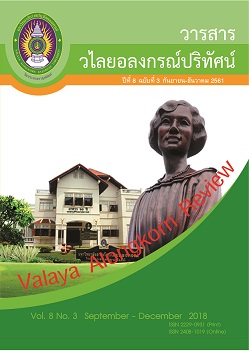การจัดการเรียนรู้เพื่อเสริมสร้างพลังชุมชนด้วยจิตอาสาในการบริหารจัดการน้ำอย่างยั่งยืนผ่านกิจกรรมฝายมีชีวิต
คำสำคัญ:
การจัดการเรียนรู้, การมีส่วนร่วม, ฝายมีชีวิต, การบริหารจัดการน้ำบทคัดย่อ
การวิจัยนี้มีวัตถุประสงค์เพื่อ 1) ศึกษาการจัดการเรียนรู้เพื่อเสริมสร้างพลังชุมชน ด้วยจิตอาสา 2) สร้างรูปแบบการจัดการเรียนรู้เพื่อเสริมสร้างพลังชุมชนแบบมีส่วนร่วมด้วยจิตอาสาในการบริหารจัดการน้ำอย่างยั่งยืนด้วยฝายมีชีวิต และ 3) เพื่อศึกษาความพึงพอใจจากการทดลองใช้รูปแบบการจัดการเรียนรู้เสริมสร้างพลังชุมชนแบบมีส่วนร่วมด้วยจิตอาสาในการบริหารจัดการน้ำอย่างยั่งยืนด้วยฝายมีชีวิต การวิจัยนี้เครื่องมือที่ใช้ ได้แก่ แบบสอบถาม แบบสัมภาษณ์ การประชุมกลุ่มย่อย กระบวนการประชาเข้าใจ กลุ่มตัวอย่าง ได้แก่ ผู้บริหาร อาจารย์ บุคลากร นักการเมืองท้องถิ่น และนักศึกษาทั้งหมด 7 คณะ จำนวนกลุ่มตัวอย่าง 350 คน ใช้วิธีการสุ่มอย่างง่าย และวิเคราะห์ข้อมูลโดยใช้สถิติ ความถี่ ร้อยละ ค่าเฉลี่ย ส่วนเบี่ยงเบนมาตรฐาน และวิเคราะห์เนื้อหา
ผลการศึกษาพบว่า
การจัดการเรียนรู้โดยเน้นผู้เรียนเป็นสำคัญ บูรณาการเนื้อหาแบบสหวิทยาการเรียนรู้ แบบโครงการจิตอาสาเป็นฐาน ออกแบบกิจกรรมการเรียนรู้เพื่อกระตุ้นให้ผู้เรียนเกิดจิตสำนึกรักท้องถิ่น และน้อมนำหลักปรัชญาของเศรษฐกิจพอเพียงมาใช้ในการดำเนินชีวิต
รูปแบบการจัดการเรียนรู้เพื่อเสริมสร้างพลังชุมชนด้วยกระบวนการจิตอาสาในการบริหารจัดการน้ำด้วยฝายมีชีวิตมี 5 ขั้นตอน ตามหลักคิด 9 ขั้น คือ 1) การสร้างแรงบันดาลใจ 2) จุดประกายความคิด 3) ศึกษาสภาพปัญหา 4) เสนอโครงการ จิตอาสา และ 5) ลงมือปฏิบัติจริง
จากการสำรวจความพึงพอใจของการทดลองใช้รูปแบบการจัดการเรียนรู้ด้วยเพื่อเสริมสร้างพลังชุมชนด้วยจิตอาสาในการบริหารจัดการน้ำอย่างยั่งยืนผ่านกิจกรรมฝายมีชีวิตได้รับผลดังนี้ ผลการสำรวจความพึงพอใจต่อการทดลองใช้รูปแบบการจัดการเรียนรู้เสริมสร้างพลังชุมชน แบบมีส่วนร่วมด้วยจิตอาสาในการบริหารจัดการน้ำอย่างยั่งยืนด้วยฝายมีชีวิต กลุ่มตัวอย่าง 350 คน มีความพึงพอใจต่อกิจกรรมในภาพรวมค่าเฉลี่ย 4.19 ขั้นความภูมิใจที่ได้ร่วมกิจกรรมจิตอาสา มีคะแนนเฉลี่ย 4.45 อยู่ในเกณฑ์มากที่สุด รองลงมาคือ เข้าร่วมกิจกรรมด้วยความสมัครใจค่าเฉลี่ย 4.23 ความพึงพอใจอยู่ในระดับมาก
เอกสารอ้างอิง
ไพฑูรย์ สินลารัตน์. (2550). CCPR MODEL สู่การเรียนการสอนเชิงสร้างสรรค์และผลิตภาพในสังคมไทย. [ออนไลน์] สืบค้นได้จาก: www.dpu.ac.th/ces/download. php?filename=1377578355.pdf. (2559, 10, ตุลาคม).
ดำรง โยธารักษ์. (2558). การเชื่อมโยงบทเรียนเครือข่ายมีชีวิต สู่การจัดการน้ำโดยชุมชน. นครศรีธรรมราช: สถาบันการเรียนรู้เพื่อจัดการตนเอง.
วิชัย วงษ์ใหญ่. (2554). จิตอาสา. สารานุกรมวิชาชีพครู เฉลิมพระเกียรติ พระบาทสมเด็จ พระเจ้าอยู่หัว เนื่องในโอกาสพระราชพิธีมหามงคลเฉลิมพระชนมพรรษา 7 รอบ 5 ธันวาคม 2554. กรุงเทพฯ: สำนักงานเลขาธิการคุรุสภา.
สมจินต์ รักฉิม และคณะ. (2559). ทรัพยากรน้ำ ฝายมีชีวิต. นครศรีธรรมราช: อักษรการพิมพ์.
สมบัติ คชสิทธิ์ และคณะ. (2557). มติที่ประชุมคณะกรรมการบริหารรายวิชาอัตลักษณ์ บัณฑิตวไลยอลงกรณ์ GE102. ปทุมธานี: มหาวิทยาลัยราชภัฏวไลยอลงกรณ์ ในพระบรมราชูปถัมภ์ จังหวัดปทุมธานี.
สมเดช คงเกื้อ. (2559). ประธานเครือข่ายฝายมีชีวิตแห่งประเทศไทย. สัมภาษณ์. (2559, 3 ธันวาคม).
สุภารัตน์ คำเพราะ. (2558). วไลยอลงกรณ์ปริทัศน์. 6(3): 197-212.
อาทิมา แป้นธัญญนนท์ และคณะ. (2560). รายงานการวิจัย การเสริมสร้างพลังชุมชน ด้วยจิตอาสาในการบริหารจัดการน้ำอย่างยั่งยืนผ่านกระบวนการฝายมีชีวิต. ปทุมธานี: มหาวิทยาลัยราชภัฏวไลยอลงกรณ์ ในพระบรมราชูปถัมภ์ จังหวัดปทุมธานี.
ดาวน์โหลด
เผยแพร่แล้ว
รูปแบบการอ้างอิง
ฉบับ
ประเภทบทความ
สัญญาอนุญาต
ข้อความที่ปรากฏในบทความแต่ละเรื่องในวารสารวไลยอลงกรณ์ปริทัศน์ เป็นความคิดเห็นของผู้นิพนธ์แต่ละท่าน มิใช่เป็นทัศนะและมิใช่ความรับผิดชอบของกองบรรณาธิการจัดทำวารสาร และ
มหาวิทยาลัยราชภัฏวไลยอลงกรณ์ ในพระบรมราชูปถัมภ์


